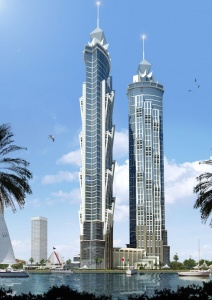JW Marriott Marquis Dubai to reinvigorate UAE hotel market

A symbol of Dubai’s resurgence and its growing importance at the centre of the global business crossroads will emerge later this year when the 1,608-room JW Marriott Marquis Dubai opens its doors to guests later this year.
A stunning addition to Marriott International’s JW Marriott world-class luxury hotel brand, the JW Marriott Marquis Dubai will open in two phases, with the first section featuring 807 rooms and numerous restaurants and lounges.
At a height of 355 meters (1,164 feet), the JW Marriott Marquis Dubai is the tallest dedicated hotel building in the world and is just 26 meters (85 feet) shorter than the Empire State Building in New York.
In addition to serving the luxury business traveller, the hotel is targeting the lucrative and increasingly important MICE (meetings, incentives, conferences and exhibitions) market, which currently does not have a hotel of sufficient scale to host such large groups.
In addition to all the dining and entertainment options, the hotel will have two ballrooms, 24 meeting rooms and a total of 5,100 square meters (54,895 square feet) of event space
“The potential to cater for the growing needs of the global business community is huge and we believe the JW Marriott Marquis Dubai is uniquely placed in that regard,” said Rupprecht Queitsch, general manager.
“The hotel will fill a long identified gap in the market where groups, meetings and conventions of up to 1,000 people can meet, sleep and dine under one roof, in one location.
“There are businesses of this size choosing various cities around the world in which to meet, but until now, Dubai has not had a single location of this size to accommodate this type of group.
“In simple terms, we will establish Dubai on the global conference market landscape.”
To give this market some context, the United States’ MICE segment, which will be one of the key targets of the JW Marriott Marquis Dubai team, contributes $106 billion to that country’s GDP – higher than automotive manufacturing ($78 billion), performing arts/spectator sports/museums ($71 billion) and information and data processing services ($76 billion)
Dubai’s excellent air service, especially with the emerging BRIC (Brazil, Russia, India and China) economies, are expected to create further opportunity.
Nasser Saidi, chief economist for the Dubai International Financial Centre (DIFC), has already noted the growth in Chinese firms coming to Dubai to set up a hub to access the African markets, and China is becoming an increasingly important export partner for the UAE.
In the first quarter of 2011, for example, China exported AED10.68bn worth of goods to Dubai and was the emirate’s second biggest export partner during that period.
“As for general business, Dubai is perfectly positioned, with its proximity to huge growth markets such as India and the fact it has literally billions of people within a five-hour flight range,” said Queitch.
“What those business travellers are looking for is a hotel that has everything they could possibly need under one roof and we truly believe this iconic new property will set a new standard in business hotels, not just in the region but globally.”

